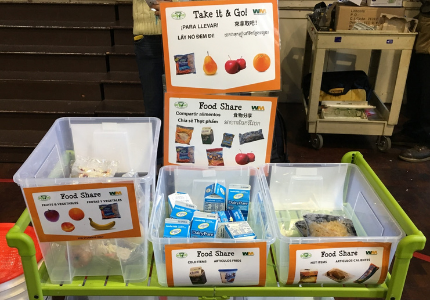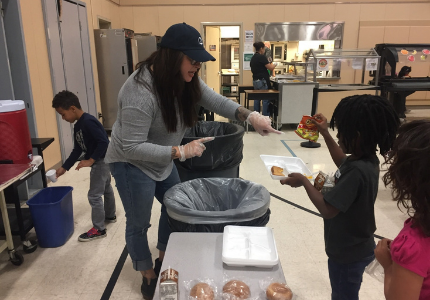Requirements for Local Education Agencies
K-12 Public Schools and School Districts
Local education agencies, which include K-12 public schools and school districts, play a vital role in fighting climate change and protecting the environment for future generations.
Local education agencies are required to maintain mandatory commercial recycling and organic recycling programs, including properly labeled recycling containers to collect bottles, cans, paper, cardboard, food waste, and other recyclable materials.
Impacted Schools and Districts
SB 1383 applies to all local education agencies, including:
- K-12 public and charter schools
- School districts
- County offices of education (that are not subject to the control of the city or county solid waste regulations)
Collection Requirements
Local education agencies must recycle their organic waste either by:
- Subscribing to a collection service that the jurisdiction provides OR
- Contracting for collection services independently OR
- Self-hauling organic waste to a specified composting facility, community composting program, or other collection activity or program.
Education
Schools must educate employees and students about organic waste prevention. Staff and administrators must periodically:
- Inspect organic waste containers for contamination.
- Inform employees if containers are contaminated.
- Instruct employees on how to properly sort material into the correct containers.
Clear signage and container labeling encourages proper sorting and minimizes contamination.
Containers
Schools must provide containers to collect organic waste and recyclables in all areas where disposal containers are provided, except in restrooms.
Schools are not required to provide a collection container if a material type is not generated in a particular room (e.g., food waste in a classroom).
Containers must conform to the proper color or labeling requirements:
- Existing internal organics collection containers may be used until they are no longer functional or until January 1, 2036, whichever comes first, as long as they are the correct color.
- Alternatively, school staff may adhere labels to existing internal containers that identify accepted and prohibited materials.
Waivers from Organic Waste Collection Requirements
CalRecycle may waive a local education agency’s obligation to comply with some or all of the organic waste collection service requirements if they meet specific exceptions (14 CCR Section 18986.3(a)).
Visit the SB 1383 Waivers webpage to:
- Determine if your local education agency meets the criteria to apply
- Learn about the waiver process
Edible Food Recovery Program
Since January 1, 2024, local education agencies with an on-site food facility (like a school cafeteria) are required to donate all edible food that they would otherwise throw away to a food recovery organization.
This requirement benefits local communities by diverting food to hungry Californians.

Requirements
Local education agencies with an on-site food facility shall arrange to recover the maximum amount of edible food that would otherwise be disposed of by:
- Contracting with food recovery organizations or services that will collect their edible food or self-hauling edible food to a food recovery organization.
- Having a formal agreement in place with a food recovery organization or food recovery service.
- This could be any type of binding agreement, including a memorandum of understanding.
- Consult the CalRecycle Model Edible Food Recovery agreement.
- Maintaining records, including:
- A list of each food recovery service or organization that collects or receives the local education agency’s edible food, including:
- Contact information for the service or organization.
- The types of food that will be collected by or self-hauled to the service or organizations.
- The established frequency at which food will be collected or self-hauled.
- The quantity of food collected or self-hauled to a service or organization for food recovery (measured in pounds recovered per month).
- A copy of contracts or written agreements between the local education agency and food recovery services or organizations.
- A list of each food recovery service or organization that collects or receives the local education agency’s edible food, including:
Resources and Best Management Practices
- California Department of Education (CDE) Links
- CDE’s Use of Share Tables in the Child Nutrition Programs bulletin
- CDE’s Guidance on Donation of Leftover Food in Child Nutrition Programs bulletin
- CDE’s Plate Waste Prevention in the Child Nutrition Programs web page
- CDE’s Food Pantries in Schools web page
- CDE’s Food Consumption Outside the Foodservice Area bulletin
- Grades of Green
- Breathe California Sacramento Region – Food scraps and Recycling program in K-12 schoos for Sacramento County and the City of Sacramento
- Go Green Initiative
- OUSD Waste Sorting 101 (includes meal sorting guides, links to videos, games, and edible food recovery programs)
- How to run a waste audit
- California Academy of Science Food Waste Audit
- WWF Food Waste Warriors – food waste audit in resources
Additional Information
- Food Recovery: Schools and local education agencies with an on-site food facility are required to recover edible food to distribute to people in need.
- School Cafeterias: School district school nutrition directors play an important role in implementing strategies to reduce organic waste and recover edible food.
- Education and Outreach: Consistent and properly labeled containers will help employees and students contribute to the proper sorting and recovery of organic waste and recyclables.
- Frequently Asked Questions: Browse frequently asked questions submitted by schools and other local education agencies.

For more information contact: Short-Lived Climate Pollutants (SLCP), Organic Waste Methane Emissions Reductions, SLCP.Organics@calrecycle.ca.gov

